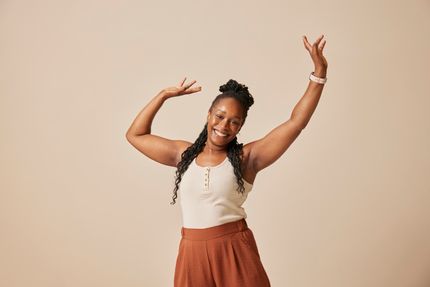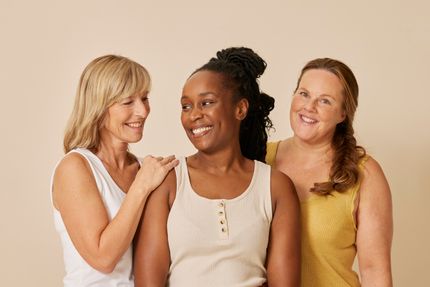

What We Can Learn from Els’s (71) Menopause Experience
Thirty years ago, menopause was barely acknowledged as a significant life stage. Symptoms such as hot flushes, joint pain, or poor sleep were often dismissed or simply not recognised. It was not spoken about. Not at home, not at work, and certainly not in the GP’s surgery. Women were largely left to work things out for themselves, without the knowledge, support, and openness that is increasingly available today.
One of those women is Els (71). She entered menopause in the early 1990s and shares her personal story about a time when menopausal symptoms were scarcely recognised. Read her full story here.
Thirty Years Later: What Has Changed?
When I read Els’s story, it struck a chord straight away. Not just because it is so relatable, but also because it painfully highlights how little space there was for women experiencing menopause at the time. Women often lived with symptoms for years, because no one put a name to what was happening.
When I worked in the pharmacy myself, in the early 2000s, I saw change begin to take root. But even now, I still regularly hear women say, “I thought it was just part and parcel of it.” That really resonates with me. Because there is so much that can be done to ease menopausal symptoms.
Thirty Years Ago: A Silence Where Symptoms Disappeared
What Els describes, I still see regularly in practice. Women who have lived with symptoms for years, simply because no one identified what was going on. Because they themselves thought it was ‘just part of life’. And that was not down to unwillingness. The internet was still in its infancy and offered no information about menopause. No accessible platforms, no stories from other women. You simply had to muddle through on your own.
During the period I worked in the pharmacy, oestrogen patches were frequently prescribed. Tailored treatment, adjusted to each woman’s situation? That was rare, and even now there is still progress to be made. It was hardly spoken about. The knowledge about the risks and benefits of hormone therapy for each woman—based on age, medical history, or time since the last period—was largely absent.
And then in 2002 came the WHI study (Women’s Health Initiative). An influential but partly misinterpreted study. The initial results received widespread media coverage: increased risk of cardiovascular disease. The result? Years of caution among doctors. Only much later did it become clear that the timing of starting is crucial. Those who start hormone therapy within 10 years after their last period do not have an increased risk of cardiovascular disease and may even experience health benefits.
HRT does carry small risks. Read more about this in our blog What Do We Now Know About the Health Risks of HRT?.
What Has Changed Since Then?
Thankfully, much has improved. Research, knowledge, and openness have increased. Women now have a better understanding of what is happening to their bodies. They are more likely to talk, ask questions, and share experiences. And doctors are also becoming more aware of the impact menopause has on daily life.
What we have now:
- Up-to-date knowledge about menopausal symptoms, hormone therapy, and timing.
- Bioidentical hormones, which act in the same way as the body’s own hormones and, when used transdermally, carry less risk of thrombosis than oral therapy.
- Greater focus on lifestyle: nutrition, exercise, and supplements can help ease symptoms.
- Platforms and communities where women can access reliable information and support.
- A growing public conversation in which celebrities are also helping to bring menopause into the spotlight.
But we are not there yet.
What Do I Still See Happening Today?
There is still no structured focus on menopause in medical education. Levels of knowledge vary significantly. And many women continue to question themselves: “Am I just making a fuss?” That thought, that deep-seated instinct to downplay your own experience, is so ingrained.
Women like Els learned that they were not allowed to complain. But even today I still hear far too often: “I thought it was just part and parcel of it.” And that really resonates with me. Because no; severe symptoms are not just something you have to put up with. And you do not have to endure it. There is so much that can be done.
What I want women to know
Your body changes. Your hormones change. That has an impact. Physically and emotionally. What you can do:
- Take yourself seriously: Your symptoms are real and deserve attention.
- Prepare well for your appointments: Write down your symptoms. Think about what questions you want to ask.
- Ask follow-up questions: Ask if your symptoms could be related to menopause. And what treatment options are available.
- Read reliable information about symptoms and treatment options: Platforms like SeeMe-nopause are here to help you.
- Seek connection: You are not alone. In personal stories, forums, or conversations with other women, you will often find recognition and practical tips.
Els as the Voice of Many
Els is not an exception. She is one of many who searched in silence for a sense of control. Women who thought: “I just have to get through it.” While we know it can be different. That you can ease symptoms. That you can feel stronger if you know what is happening and what you can do yourself.
The interview we published with Els shows how far we have come. My hope is that together we keep moving towards a future in which no woman ever has to wonder: “What is happening to me?” Without an answer. Without support. Without control.
Menopause is a natural, but often challenging, phase of life. If your symptoms ease, this period can even feel like a time of growth. A time for reflection, development, and reassessment. And I wish that for every woman.
Let me close with Els’s own words:
“You don’t have to just wait for it to pass. And take yourself seriously.” Wise words from someone with lived experience.
Tips and advice










